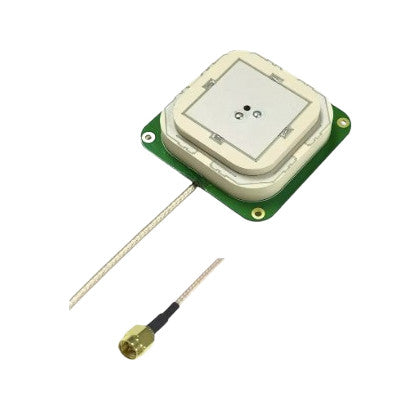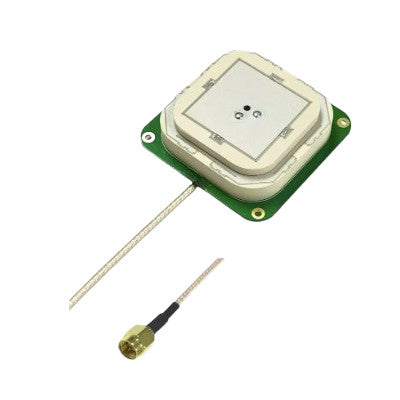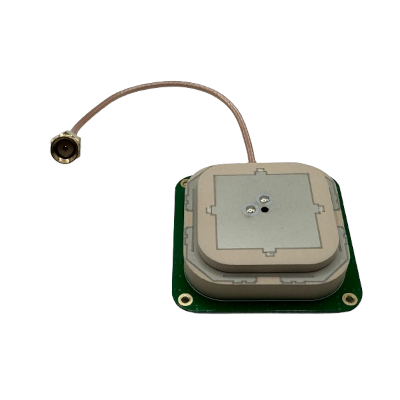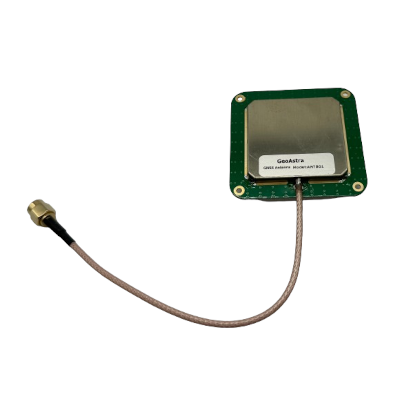GeoAstra ANT501 high-precision built-in GNSS antenna (L1 L5 multi-frequency, multi-feed point)
GeoAstra ANT501 high-precision built-in GNSS antenna (L1 L5 multi-frequency, multi-feed point)
Couldn't load pickup availability
Volume Discount Table
| Minimum Qty | Discount |
|---|---|
| 2 + | 5% off |
| 5 + | 6% off |
| 10 + | 7% off |
| 100 + | 9% off |
The ANT501 high-precision GNSS antenna features a multi-feed point design for stable signals and reduced errors. Supporting GNSS L1/L5, GPS, GLONASS, Beidou, GALILEO, and L-band differential signals, it offers high passive gain and a wide pattern beam for excellent low elevation reception. With pre-filtering technology, low noise coefficient, and strong anti-interference capability, the ANT501 is ideal for intelligent driving, surveying, precision agriculture, and digital machinery operations, providing reliable and accurate GNSS data.
Key Features:
Multi Feed Point Technology
• Multi Feed Point Technology: This technology involves using multiple feed points in the antenna design. Each feed point is where the signal enters or exits the antenna. By having multiple feed points, the antenna can ensure more uniform and balanced signal reception and transmission.
• Right-Handed Circular Polarization (RHCP): This polarization helps the antenna to better align with the polarization of GNSS signals, which are typically right-handed circularly polarized. This alignment is crucial for accurately receiving satellite signals.
• Phase Center Performance: The phase center is the point in the antenna where the signal appears to originate. Stability of the phase center is critical for accurate positioning. Multi feed point technology helps maintain a stable phase center, reducing errors in the positioning data.
• Reduction of Measurement Error: With a stable phase center and uniform signal reception, the antenna minimizes measurement errors, leading to more accurate and reliable GNSS data.
High Passive Gain and Wide Pattern Beam
• High Passive Gain: Passive gain refers to the antenna’s ability to concentrate received signals without the use of an amplifier. A high passive gain means the antenna can effectively receive weak signals from satellites, enhancing its overall sensitivity and performance.
• Wide Pattern Beam: This refers to the antenna’s ability to receive signals from a wide range of angles. A wide pattern beam ensures that the antenna can capture signals from satellites at low elevations (near the horizon), which are often more challenging to receive. This increases the number of satellites the antenna can use for positioning, thereby improving accuracy and reliability.
• Reception Effect of Low Elevation Signals: Ensuring good reception of low elevation signals means the antenna can maintain connectivity with satellites that are low on the horizon. This is important for comprehensive satellite coverage and continuous positioning accuracy, especially in environments with obstructions.
Pre-Filtering, Low Noise Coefficient, and Strong Anti-Interference Ability
• Pre-Filtering: Pre-filtering technology involves filtering out unwanted signals and noise before they reach the main amplification stage. This process helps to ensure that only the desired GNSS signals are amplified, reducing the impact of out-of-band interference.
• Low Noise Coefficient: The noise coefficient, or noise figure, indicates how much noise an amplifier adds to the signal it processes. A low noise coefficient means the amplifier adds very little noise, preserving the quality of the received signal. This is crucial for maintaining high precision in GNSS data.
• Strong Anti-Interference Ability: This feature ensures that the antenna can effectively reject or minimize the impact of interfering signals from other sources (such as other communication systems). Strong anti-interference capability is important
Technical Specifications:
GPS
• L1/L5
GLONASS
• L1
BEIDOU
• B1/B2a
GALILEO
• E1/E5a
Peak Gain
• ≥ 3.5 dBi @Fc, with 100 mm ground plane
Polarization
• RHCP (Right-Hand Circular Polarization)
Axial Ratio @ Zenith
• ≤ 1.5 dB
Azimuth Coverage
• ≤ 1.5 dB
Impedance
• 50 ohm
Frequency Range
• 1176.45 ± 10.23 MHz
• 1559 MHz ~ 1606 MHz
LNA Gain (dB)
• 28 ± 2 dB (Typ. @ 25°C)
Noise Figure (dB)
• ≤ 2.0 dB @ 25°C
Output VSWR
• 1.8:1 typ. 2.0:1 max
Operation Voltage
• 3.0 ~ 16V DC
Operation Current
• < 45 mA
ESD Circuit Protection
• 15 kV air discharge
Product Size
• 55 mm * 55 mm * 16 mm
Connector
• SMA-J
Weight
• < 80 g
Cable Length
• 15 cm
Operating Temperature
• -40°C ~ +85°C
Storage Temperature
• -45°C ~ +85°C
Humidity
• 95% non-condensing
Vibration
• 3 axis, sweep = 15 min, 10 to 200 Hz sweep: 3G
Shock
• Vertical axis
Dimensions (mm):







